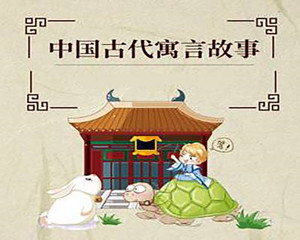古代寓言原是民间口头创作,文学体裁的一种。含有讽喻或明显教训意义的故事。它的结构简短。主人公可以是人,可以是动物,也可以是无生物。多借用比喻手法,使富有教训意义的主题或深刻的道理在简单的故事中体现,而还需要自己去理解,思考,这就是和西方寓言的不同之处。

《古代寓言·树丫》
乡人多以树之丫叉,支为坐凳者。
父命其子求之山中,子持斧去,竞日,徒手归。你责之。子曰:“丫叉尽有,奈都是朝上生的。”
——《笑府》
Tree Forks
The people living on a certain mountain use tree forks for stool legs.
A father sent his son to get one. The son took an axe and went. But at the end of the day he came back empty-handed. When his father scolded him, he answered, “Of course, there are plenty of tree forks there but they all grow upwards.”
Xiao Fu (Treasure-House of Jokes)
(杨宪益、戴乃迭 译)
更多精品翻译素材,敬请关注可可英语。











